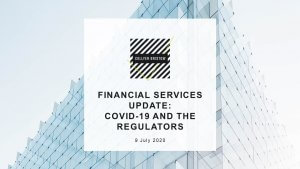- Banking & financial disputes
- Banking Litigation
- Financial services

Shorter Reads
A new direction for FCA decision making
Despite receiving a high volume of criticism to the proposed changes during the FCA’s consultation, the FCA has chosen to proceed with the changes as originally proposed.
2 minute read
Published 14 February 2022
Key information
As part of the Financial Conduct Authority’s (“FCA”) “Transformation Programme” to become a more innovative and assertive regulator, the FCA has announced its new approach to decision making. The policy statement (PS21/16) amends the FCA’s Enforcement Guide (EG) and Decisions Procedure and Penalties Manual (DEPP) and transfers key decision making powers from the Regulatory Decisions Committee (“RDC”) to senior FCA staff.
Despite receiving a high volume of criticism to the proposed changes during the FCA’s consultation, the FCA has chosen to proceed with the changes as originally proposed.
Decisions: Transfer of power
Prior to the change in policy, the following decisions were made by the RDC:
- authorisation of a firm’s or an individual’s approval;
- varying of a firm’s permission or imposing a requirement on a firm;
- contested decisions to cancel a firm’s permission; and
- commencing civil proceedings or criminal proceedings.
As of 26 November 2021, the responsibility for the above decisions has been transferred to senior FCA staff (known as “Executive Decision Makers”). Decisions taken by an Executive Decision Maker will either be made by (1) an individual of at least Director level; or (2) at least two members of senior FCA staff.
The changes mean that the responsibility of the RDC is reduced to contested enforcement cases, where a sanction or disciplinary measure is being proposed against a firm or individual.
Statutory notices: The representations process
In addition to the transfer of decision making power, there has been a change to the representations process. Under the old regime, recipients of statutory notices (e.g. a warning notice or supervisory notice) could make both oral and written representations to the FCA before a decision notice was issued. This allowed firms and individuals to assess the best method for responding to the notice, having regard to the specific nature of the issues at hand. Under the new rules, where a statutory notice has been issued by an Executive Decision Maker, written representations are the default and oral representations are only permitted in “exceptional circumstances” where “prohibiting oral representations are likely to impact on the fairness of the decision” (DEPP 2.3.1A).
The ability to advance both oral and written representations remains in place for statutory notices issued by the RDC.
Comment
There is no doubt that a more flexible and efficient regulator, and one that has the ability to make quick decisions, is widely welcomed. However, there are two key concerns with these changes:
- Transfer of power from the RDC – lack of independence: The transfer of decision making powers from the RDC to FCA staff members does raise concerns around the independence between the investigators and the decision makers. While the RDC is not independent of the FCA it is “operationally” separate to the FCA investigation team, which ensures that there is a clear separation between investigation / evidence gathering and decision making. Additionally, the RDC is advised by its own legal team (separate to the FCA’s Enforcement Legal team and the Office of the General Counsel). Under the new regime, the same lawyers now might advise the investigating team and the decision maker. While the FCA has said that lawyers acting in this capacity will be “overseen separately” it is unclear how this will work in practice.
- Removal of right to oral representations – procedural unfairness: It is possible that the removal of the right to oral representations compromises procedural fairness. By removing this opportunity, it reduces the ability of firms and individuals to (1) make effective representations; and (2) to ensure the FCA decision maker has fully appreciated, understood and interrogated the point that is being advanced. Another problem is that if a firm or individual does consider that there are exceptional circumstances necessitating oral representations, this will delay the decision making process even further, as they will need to put in representations as to why oral representations are necessary and, in turn, the FCA will need to assess whether there is any “impact on fairness” – thereby creating more steps in the decision process.
The FCA has stated that it will conduct a 6 month post-implementation review to assess the effectiveness of the changes. Hopefully this will show whether the changes will speed up the decision making in practice, or merely create further complications in the process given some of the issues we have highlighted above.
Related content
Shorter Reads
A new direction for FCA decision making
Despite receiving a high volume of criticism to the proposed changes during the FCA’s consultation, the FCA has chosen to proceed with the changes as originally proposed.
Published 14 February 2022
Associated sectors / services
As part of the Financial Conduct Authority’s (“FCA”) “Transformation Programme” to become a more innovative and assertive regulator, the FCA has announced its new approach to decision making. The policy statement (PS21/16) amends the FCA’s Enforcement Guide (EG) and Decisions Procedure and Penalties Manual (DEPP) and transfers key decision making powers from the Regulatory Decisions Committee (“RDC”) to senior FCA staff.
Despite receiving a high volume of criticism to the proposed changes during the FCA’s consultation, the FCA has chosen to proceed with the changes as originally proposed.
Decisions: Transfer of power
Prior to the change in policy, the following decisions were made by the RDC:
- authorisation of a firm’s or an individual’s approval;
- varying of a firm’s permission or imposing a requirement on a firm;
- contested decisions to cancel a firm’s permission; and
- commencing civil proceedings or criminal proceedings.
As of 26 November 2021, the responsibility for the above decisions has been transferred to senior FCA staff (known as “Executive Decision Makers”). Decisions taken by an Executive Decision Maker will either be made by (1) an individual of at least Director level; or (2) at least two members of senior FCA staff.
The changes mean that the responsibility of the RDC is reduced to contested enforcement cases, where a sanction or disciplinary measure is being proposed against a firm or individual.
Statutory notices: The representations process
In addition to the transfer of decision making power, there has been a change to the representations process. Under the old regime, recipients of statutory notices (e.g. a warning notice or supervisory notice) could make both oral and written representations to the FCA before a decision notice was issued. This allowed firms and individuals to assess the best method for responding to the notice, having regard to the specific nature of the issues at hand. Under the new rules, where a statutory notice has been issued by an Executive Decision Maker, written representations are the default and oral representations are only permitted in “exceptional circumstances” where “prohibiting oral representations are likely to impact on the fairness of the decision” (DEPP 2.3.1A).
The ability to advance both oral and written representations remains in place for statutory notices issued by the RDC.
Comment
There is no doubt that a more flexible and efficient regulator, and one that has the ability to make quick decisions, is widely welcomed. However, there are two key concerns with these changes:
- Transfer of power from the RDC – lack of independence: The transfer of decision making powers from the RDC to FCA staff members does raise concerns around the independence between the investigators and the decision makers. While the RDC is not independent of the FCA it is “operationally” separate to the FCA investigation team, which ensures that there is a clear separation between investigation / evidence gathering and decision making. Additionally, the RDC is advised by its own legal team (separate to the FCA’s Enforcement Legal team and the Office of the General Counsel). Under the new regime, the same lawyers now might advise the investigating team and the decision maker. While the FCA has said that lawyers acting in this capacity will be “overseen separately” it is unclear how this will work in practice.
- Removal of right to oral representations – procedural unfairness: It is possible that the removal of the right to oral representations compromises procedural fairness. By removing this opportunity, it reduces the ability of firms and individuals to (1) make effective representations; and (2) to ensure the FCA decision maker has fully appreciated, understood and interrogated the point that is being advanced. Another problem is that if a firm or individual does consider that there are exceptional circumstances necessitating oral representations, this will delay the decision making process even further, as they will need to put in representations as to why oral representations are necessary and, in turn, the FCA will need to assess whether there is any “impact on fairness” – thereby creating more steps in the decision process.
The FCA has stated that it will conduct a 6 month post-implementation review to assess the effectiveness of the changes. Hopefully this will show whether the changes will speed up the decision making in practice, or merely create further complications in the process given some of the issues we have highlighted above.
Associated sectors / services
- Banking & financial disputes
- Banking Litigation
- Financial services
Need some more information? Make an enquiry below.
Enjoy reading our articles? why not subscribe to notifications so you’ll never miss one?
Subscribe to our articlesMessage us on WhatsApp (calling not available)
Please note that Collyer Bristow provides this service during office hours for general information and enquiries only and that no legal or other professional advice will be provided over the WhatsApp platform. Please also note that if you choose to use this platform your personal data is likely to be processed outside the UK and EEA, including in the US. Appropriate legal or other professional opinion should be taken before taking or omitting to take any action in respect of any specific problem. Collyer Bristow LLP accepts no liability for any loss or damage which may arise from reliance on information provided. All information will be deleted immediately upon completion of a conversation.
Close







































































